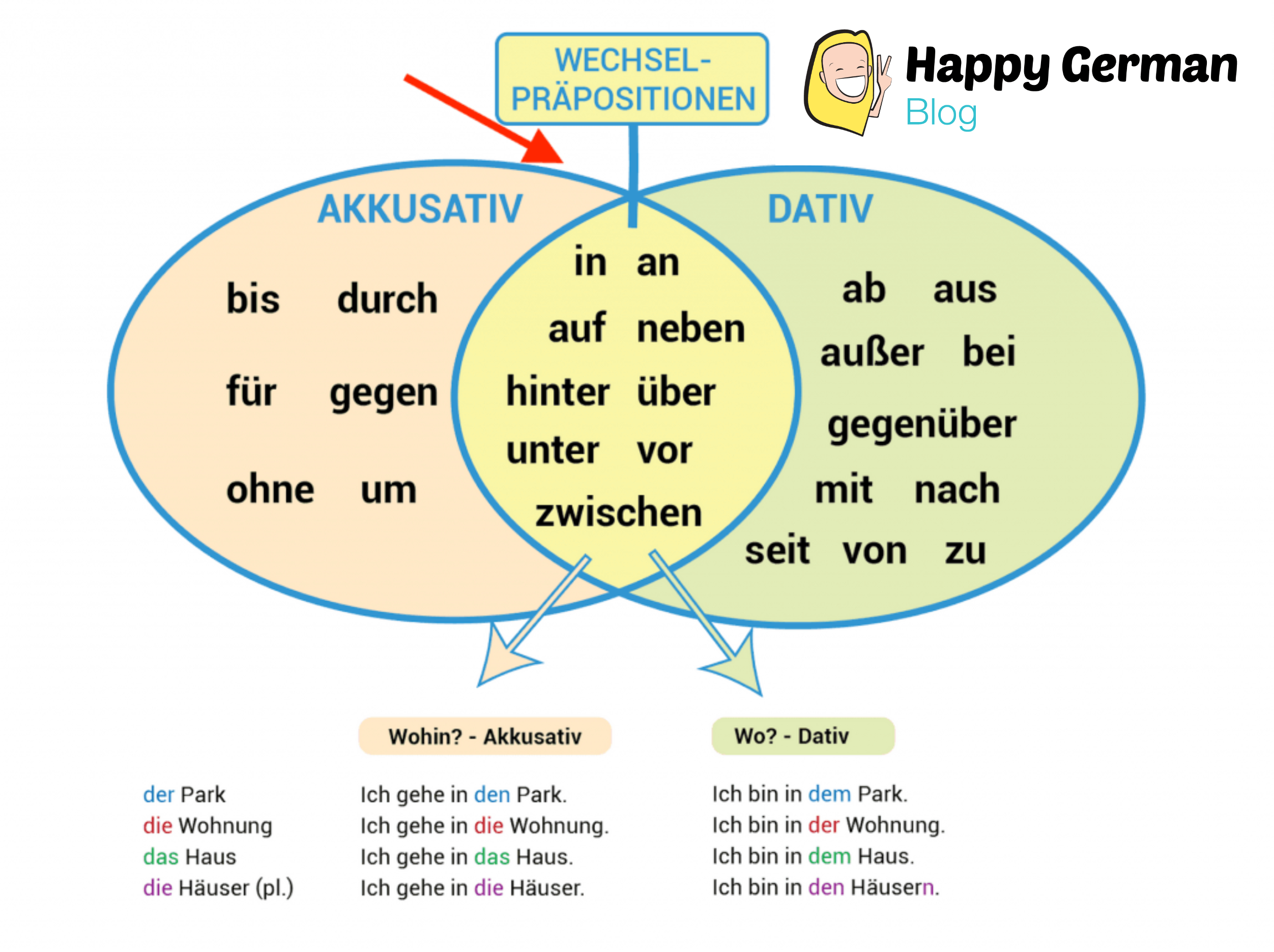When To Use The Accusative Case?
I don’t want to ACCUSE you, dear reader, of not knowing what the Accusative is, but since you’re reading this article, I assume you want the full scoop on the German Accusative case, let’s go back to the Nominative case first.
You already know that the Nominative case is the form of a noun the subject of a sentence takes, right? It is also the basic form, the way it appears in a dictionary. Take this example:
- Der Pullover ist schön. (The sweatshirt is nice.)
→ “der Pullover” is in the Nominative case. It's the subject of the sentence.
However, when “der Pullover” changes its function and is no longer the main actor, it will no longer be in the Nominative case:
- Ich kaufe den Pullover. (I'm buying the sweatshirt.)
→ “den Pullover” is what you are buying. It’s the object of the sentence in Accusative case.
Notice the change?
→ “ich” is now the actor/ actress of the sentence, in the Nominative case.
→ “der Pullover” is not in the Nominative case anymore, but it has become “den Pullover” in the Accusative case, the object of the sentence.
What Is The Accusative?
You can compare the Accusative object to the “direct object” in an English sentence. A direct object is the thing or person that the verb of a sentence is happening to. Since, in the above sentence, I am buying the jersey, “I” is the one who is doing things. “I” is therefore in the Nominative case (= subject of the sentence) and “the jersey” is what “I am buying”, and so it represents the Accusative object:
- Ich kaufe den Pullover. (I’m buying the jersey.)
A few things to keep in mind about Accusatives:
How To Form The Accusative
In the table below, you see the articles in the Nominative and Accusative case. Can you spot the differences?

Have you noticed that the forms are almost identical? That’s good news, isn’t it? The only forms that change here are the masculine forms. In the Accusative case, the definite article “der” becomes “den”, and the indefinite article “ein” becomes “einen”.
Accusative After Certain Verbs
Almost all German transitive verbs require an Accusative object. The verbs that require the Dative case are the exception. Let me give you some examples. We will start with the Nominative case, so you can see the difference:
- Der Fisch ist schön. (The fish is beautiful.)
→ Here, “der Fisch” is the subject. And yes, it's in the Nominative case.
After the following verbs, “Fisch” will be used in the Accusative case, as the object of the sentences (the thing or person the verb is "happening" to):
- sehen:
Ich sehe einen Fisch. (I see a fish.)
Ich sehe den Fisch. (I see the fish.)
- haben:
Ich habe einen Fisch. (I have a fish.)
Ich habe den Fisch. (I have the fish.) - kaufen:
Ich kaufe einen Fisch. (I buy a fish.)
Ich kaufe den Fisch. (I buy the fish.)
- essen:
Ich esse einen Fisch. (I eat a fish.)
Ich esse den Fisch. (I eat the fish.)

Ich habe den Fisch. (I have got the fish.)
Jetzt habe ich ihn nicht. (Now, I don't have it.)
Anja made a video about the most common verbs taking the Accusative. Check it out:
Accusative In Combination With The Dative
There are verbs which take the Accusative AND the Dative. Usually,
Let's have a look at some examples:
- geben: Ich gebe dem Mann den Fisch. (to give, literally: I give the man the fish. / better: I give the fish to the man.)
- zeigen: Ich zeige meinem Mann den Park. (to show, literally: I show my husband the park./ better: I show the park to my husband.)
- empfehlen: Ich kann dir einen schönen Ort empfehlen. (to recommend: I can recommend a nice place to you.)

Ich zeige meinem Mann ein Buch.
(I’m showing a book to my husband.)
Here you can find Anja‘s video about verbs with Accusative AND Dative:
Accusative After Certain Prepositions
Here’s an overview of all the German prepositions and which cases they take:

You might find the acronym DOGFUB useful to remember the prepositions which always take the Accusative:
- durch: Wir fahren durch den Tunnel. (Through: We drive through the tunnel.)
- ohne: Ich gehe ohne dich. (Without: I go without you.)
- gegen: Sie läuft gegen den Baum. (Against: She walks against the tree.)
- für: Die Kerze ist für dich. (For: The candle is for you.)
- um: Sie läuft um den Baum. (Around: She walks around the tree.)
- bis: Bis nächsten Sonntag! (Until: See you next Sunday! Literal translation: Until next Sunday!)
Anja also made a video about prepositions which demand the Accusative:
Accusative With Two-Way Prepositions (Wechselpräpositionen)
Maybe you spotted something in the overview earlier. There are some “bisexual” prepositions (Wechselpräpositionen), which sometimes like the Accusative and sometimes like the Dative:

We will talk about these in the post “German Wechselpräpositionen”, but here’s a short explanation:
When there is movement from a location A to a location B, which means someone is being ACTIVE, then we use the ACcusative after the given prepositions. The movement is expressed in the verb. Remember:
ACtive → ACcusative
Here are some examples with the prepositions in bold italic letters:
(Note: For these examples we use masculine nouns only, so that the Accusative is more apparent. We’re saying this because there are no changes to the articles or nouns in feminine and neutral nouns in singular, and none in plural. Good to know, right?)
Er springt in den See. (He’s jumping into the lake.)
Sie geht an einen See. (She’s going to a lake.)
Der Mann läuft unter einen Baum. (The man is running under a tree.)

Ich laufe schnell unter einen Baum.
(I am running under a tree quickly.)
Watch Anja's complete playlist about Two-Way Prepositions ("Wechselpräpositionen") here:
The German Accusative With Greetings And Wishes
In German, we “wish” people things. For example, we would say:
- Ich wünsche dir ... (I wish you ...)
- einen schönen Tag. (a good day.)
- eine gute Reise. (good travels.)
- gute Besserung. (a good recovery./ better: ... fast recovery.)
→ The “dir” is in the Dative case. - It represents the person whom you’re offering/ directing the congratulations to.
→ The thing - the congratulations, the greetings - that you’re offering are in the Accusative case.
In German greetings and congratulations, we often omit the “we/ I wish you” and just say the things we’re offering to the listener. However, dropping the subject, verb and the person we're addressing still leaves us with the greetings and congratulations in the Accusative case. Check out the following examples:
- Schönen Tag! (Have a good day!)
- Schönen Sonntag! (Have a good Sunday!)
- Schönes Wochenende! (Have a good weekend!)
- Viel Spaß! (Have lots of fun!)
- Gute Nacht! (Good night!)
- Gute Besserung! (Get well!)
- Herzlichen Glückwunsch! (Congratulations!)
- Angenehme Reise! (Enjoy your trip!)
- Guten Morgen! (Good morning!)
- Guten Tag! (Good day!)
- Guten Abend! (Good evening!)

Das Faultier: “Guten Abend!”
(The sloth: “Good evening!”)
In some of them you will notice the ending “-en”. It’s because we have shortened the sentences, dropped the subject (I or we) and verb (wish) and the person (you) we are directing ourselves to. However, the remaining nouns (and their articles and adjectives) still have to be in the Accusative case. Good for us, we only notice a difference in masculine nouns, where the article and adjective endings in the Accusative case are “-en”. Let’s have a look at the transformation:
“der/ ein Tag” (Nominative case)
- “Ich wünsche dir einen guten Tag.” (Accusative case endings for the masculine noun “Tag”.)
As we said earlier, Germans usually omit “Ich wünsche dir” and so we are left with:
- “Guten Tag!“
When a German is speaking English, you'll sometimes hear them say something a bit funny at the end of a conversation or meeting. When they leave, instead of saying “Have a good day!” they directly translate from German (“Schönen Tag!”) to English and say “Beautiful day!”. Believe me, they’re not trying to strike up a conversation about the weather, they’re wishing you a good day. Just smile and say “Gleichfalls!” (likewise).
The Accusative In Adverbial Phrases
An adverbial phrase is just a fancy way of saying that the phrase tells us something more about the verb, for example,
- when or how long the action lasted,
- the expression of a measurement or value, or
- the distance or location of the action.
The Accusative To Express Length Of Time Or Point In Time
Here are some examples with adverbial phrases that designate a point of time or length of time and are required to be in the Accusative case:
- Ich habe den ganzen Tag Avocado-Toast gegessen. (I ate avocado toast all day.)
→ This example tells us how long ("den ganzen Tag") the action of eating avocado toast lasted. The adverbial phrase is in the Accusative case. In Nominative case it would look like this: "der ganze Tag".
- Mein Freund kaufte letzten Freitag Avocados ein. (My friend bought avocados last Friday.)
→ The second example shows when the action took place.
- Ich war einen Monat süchtig nach Avocados. (I was addicted to avocados for a month.)
→ Like the first example, it tells us how long the action (of being addicted to avocados) lasted.
The Accusative To Express Measurements Or Values
Expressions in the Accusative case are all around you. We use them - again as adverbial phrases - to express measurements or values:
- Die Avocado ist einen Meter lang. (The avocado is one metre long.)
→ In the above example you can see the measurement of one metre used in the Accusative case "einen Meter". In Nominative case it would be "ein Meter".
- Sie ist schon einen Monat alt. (It's already one month old.)
→ The value, in this case the age is expressed in the Accusative.
- Der Kern ist drei Zentimeter breit. (The pit is three centimeters wide.)
→ The third example shows another adverbial phrase of measurement in the Accusative case.
Note: In the last example, you cannot see the measurement is in the Accusative case (since “Zentimeter” here is in the plural). However, it still represents the Accusative case.
Go to our post on plurals if you’d like to revise them.

Avocado links: "Ich bin schon einen Monat alt."
(Avocado on the left: "I am already one month old.")
Using The German Accusative Case To Talk About Distance, And In Adverbs Showing Motion
Last but not least: Sometimes we use the Accusative to talk about distance and in adverbs showing motion:
- Meine Oma ist den Berg hochgelaufen. (My grandma walked up the mountain.)
- Sie kam den gleichen Weg herunter. (She came down the same way.)

Der Schimpanse rutschte den Hügel herunter.
(The chimpanzee slid down the hill.)
Hint: You’ll see this “adverbial Accusative” quite often with the direction adverbs with "her-" and "hin-" ("herunter", "herauf", "hinweg", "hinein").
Du hast es den ganzen Weg hierher zum Ende geschafft! (You have made it all the way here to the end!)
Herzlichen Glückwunsch!!!! (Congrats!!!!)
(PS: "den ganzen Weg", “Herzlichen Glückwunsch” are ... you guessed it 😉
Now, are you ready for some exercises? Test your understanding!




